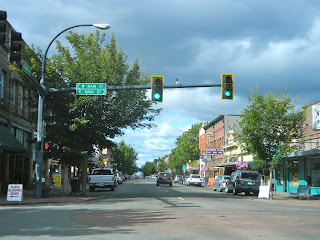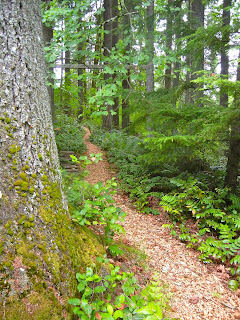The first thing I did when I arrived was get a library card. I didn’t have the proper credentials (like a driver’s license), but I know the person behind the desk. Perks. The first book that caught my eye on the new book shelf in my new-old Carnegie library (remodeled since I first loved it) was Running Away to Home, a memoir by Jennifer Wilson of a year spent with her family in Croatia, the land of her ancestors. It is what I have done; and I am struggling, as did she.
I purchased license plates this week (as well as a driver's license and auto insurance; and I registered to vote﹣learning from my mother that voting is all done by mail, no polling places). I must say, Washington has a terrific plate and I am glad through my happy and sad tears to put one on the back﹣and the front (I need to get bolts)﹣of my car. My North Carolina plate (or tag as they are called there, something I never got used to) was SWW (SouthWest Washington). My new plate is AIT. “What the heck?” I think when they are handed to me. What is that an acronym for? Ah, “Alien in Training.” Yep, that’s about right. I am feeling more than a bit of that right now. Everything is familiar here, except me in it.
They say you can’t go home again; but you can. Just don’t expect it to be the same as it was when you left. Even in small town America. The forever Fuller Market Basket became Shop ‘n Kart since the last time I was here, a year ago. Still a depressing place. A couple newish businesses are gone, too. An historic building on the main street through town burned this year. The El Rancho Tavern from my original years finally went the way of the Doghouse Tavern. No loss there. I wonder if it is an indicator of an improved populace; then my sister tells me that a group of citizens called Centralia One, buys taverns when they go up for sale. A condition of resale is that it cannot be a tavern again; that, in fact, alcohol cannot be served. Which means it really can’t be a restaurant either, which is too bad; but they are helping change the flavor of a town that was full of heavily used low-class drinkeries when I left here 42 years ago. A plethora of outlet stores at the interstate and of antique stores in town have cropped up in the intervening years. Centralia is trying to reinvent itself, and that is a good thing, if not the flavor I might have chosen.
 The post office is still one of the golden oldie ones, and has that oak and ancient paper smell. I love it. The Shanghai Restaurant is apparently still going strong, next door to Hubbub, my sister’s six-year-old shop. I’m sure I don’t know why. It is exactly the same as it always was, at least on the outside. I don’t believe I have ever been inside the door, so I wouldn’t know if it has changed. Somehow I doubt it. An experimental rain garden is put in next to
The post office is still one of the golden oldie ones, and has that oak and ancient paper smell. I love it. The Shanghai Restaurant is apparently still going strong, next door to Hubbub, my sister’s six-year-old shop. I’m sure I don’t know why. It is exactly the same as it always was, at least on the outside. I don’t believe I have ever been inside the door, so I wouldn’t know if it has changed. Somehow I doubt it. An experimental rain garden is put in next to  Hubbub’s sculpture garden since my arrival. The city was awarded a large grant to be more green and more beautiful, but it seems there are foot draggers, so they are testing and proving its worth. The sidewalk is porous, and pleasant to walk on; and rain water soaks in and returns to the garden alongside it rather than into the storm drain. How the heck can that be a bad thing?
Hubbub’s sculpture garden since my arrival. The city was awarded a large grant to be more green and more beautiful, but it seems there are foot draggers, so they are testing and proving its worth. The sidewalk is porous, and pleasant to walk on; and rain water soaks in and returns to the garden alongside it rather than into the storm drain. How the heck can that be a bad thing?I stop the other evening to take a picture of the Gibson House sign, and am informed by an inebriated young man on the sidewalk that, “Ma’am, that’s not the Gibson House anymore.” I just say, “I know that, [son].” What I don't tell him is that before the building was the Gibson House﹣that it’s not anymore, thank you﹣it was Proffitt’s Department Store where I bought my Girl Scout uniforms, and dresses for special occasions as opposed to daily clothing needs, which were purchased at JC Penney. And before it was the Gibson House restaurant, it was the Gibson House gift and book store, which used to be two blocks down the street and was my first place of employment when I was in high school. Bet you didn’t learn that in your history class, not that you would have been paying attention. Twerp.
The historic Fox Theater (1930), which I was not allowed to frequent every Friday night with my friends, is slowly being restored to its original appearance inside and out as funding allows, after years of vacant decay. The goal is to be a model of the art deco period and a state-of-the-art performing arts center. And the Olympic Club, a classy tavern formerly owned by the family of one of my classmates, is now a hotspot for gathering, eating, and living-room-style-seating movies; as well as an interesting hotel with shared bathrooms.
Centralia was founded in 1875 by George Washington, the son of a black slave, and a jack-of-all trades who journeyed across the country to the Pacific Northwest to create a new life. When George was a baby, his father was sold and his mother left him with a white couple who raised him. Because the Oregon Territory barred settlement by Blacks, his "adoptive" parents filed a claim for 640 acres, unofficially on his behalf. When the area became part of the new Washington Territory, which did not have such a ban, the Cochrans deeded him the land, from which George and his wife founded the town of Centerville, later renamed Centralia.
Nicknamed the Hub City, Centralia was a railroad hub, equidistant between Seattle and Portland, the mountains and the ocean. I grew up on the wrong side of the active tracks. That is, the wrong side to get anywhere else in a hurry. My dad and I, waiting at one crossing or another, counted cars and looked for the "blt" date, to identify the oldest car on the trains. I have done research. There are currently five Amtrak trains a day in each direction. And the Seattle to Portland corridor hosts an average of 50 freight trains each day; all passing, of course, the three remaining open crossings between town and my house; sometimes rattling straight through, sometimes stopping and backing up and blocking the tracks for long minutes. There are two viaducts, but figuring out when to bail and when to be patient is tricky. I have put a book in my car.
So there is the town's history lesson. Not much has changed at my childhood home on the hill. The gardens are more beautiful than ever. But my mother is disappointed with them. As always. I am living differently here. My quarters consist of a bedroom (the one that was mine when I left for college in 1970), a good-sized living room with the biggest closet I have ever had, and a three-quarter bathroom, neither of which were finished rooms when I left home. I have a table, a small refrigerator, and a microwave at one end of the living room. I call that a kitchen; more like a kitchy. I cook for my mother and myself in her kitchen; with her cookware and utensils, and food; on her counters. They are not the things I am accustomed to using or cooking, and nothing is organized in the way I would want it to be. But it is not my space, so I must learn to make do. Outside my living room, in the garden my sister created, I am getting reacquainted with the slugs.
Cultivating a new garden, or restoring an old one, is hard work. It was hard at my 609 Edmund Street garden; and this one is no easier. At least I knew the tools there: shovel, saw, hoe, loppers, trowel. I haven't yet figured out what I need for this one. In that garden I decided what I wanted to plant﹣and was solely responsible for what grew and what died. Now others have suggestions for what gets planted and instructions for care. And I feel guilty if I choose differently. Perhaps the community garden (like this one on a steep hill in Seattle) is, in the end, the best. Built of cooperation and a co-mingling of ideas and personalities. I just have to make sure I do not fail to contribute my ideas; and then learn to let go of the outcome, or at least bend. Not easy. (Of course, I am not talking about simple vegetation and dirt gardens here; gardens of life are much trickier.)
I am trying to find my own patch of soil, in a garden established by others who might prefer that I just water what they planted. I left my North Carolina garden because maintaining is not my favorite part of gardening. My gardens in the past have not involved a schematic design. I envisioned as I went. Sometimes it worked, sometimes not so much. I think this garden will need a plan; one that involves finding a balance between nourishing what is here and planting what I need for abundant living. It won't happen quickly.
In her frustration in the attempt to discover a life in Croatia from the time she arrived there, Jennifer Wilson's (Running Away to Home) husband told her, “You’re trying to figure everything out before you actually enjoy this. I don’t think the point is to try to figure anything out.” I will try to let the plan unfold as it will. Meanwhile I hold onto the daily fact that the air here among the hills and mountains and fir trees, vibrates with energy; whereas it sucked the life out of me in the southeast. I will discover what to do with that energy; and keep breathing deep in the meantime.



















































